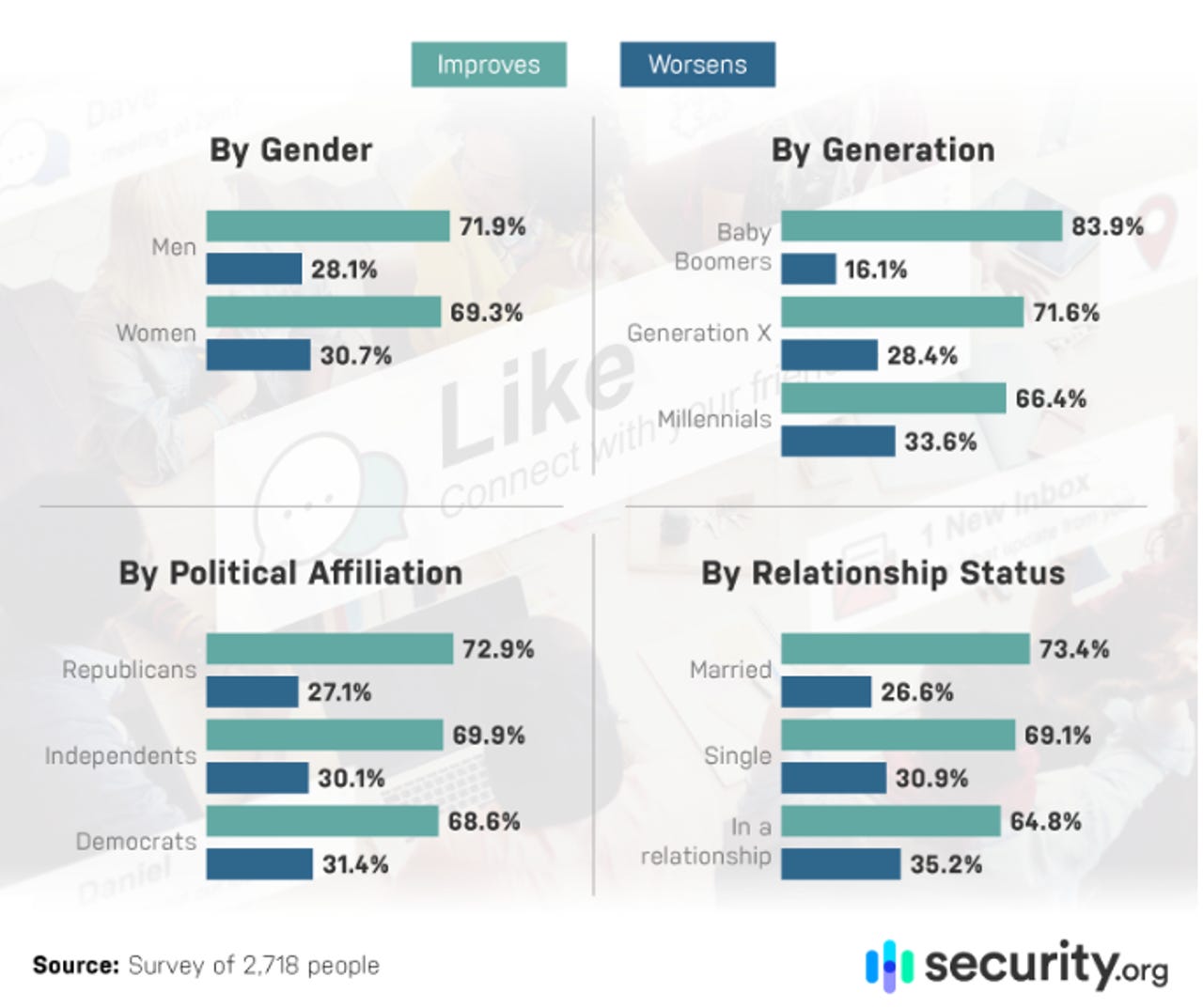One in three millennials say social media worsens their lives

Almost all of us interacts with at least one social media platform in our daily lives, but recent studies have cast doubt on whether or not it is actually all that good for us.
Los Angeles, CA-based security review company Security.org surveyed over 2,700 mainly millennial Americans to find out if social media is a positive force, or a force to dog us and make our lives worse.
The results showed various levels of relationships and user satisfaction with social media in their lives.
When asked about the effects of social media, almost three-quarters (70.4%) of people said it improved their life satisfaction. But opinions -- and negative consequences -- were not equal for all respondents.
Over four out of five (83.9%) baby boomers reported that social media improves their lives -- more than younger generations. Yet, 1 in 3 millennials (33.6%) feel that social media worsens their lives (more than any generation).

Marital status matters too. Nearly 3 in 4 married couples reported greater life satisfaction because of social media, more than singles (69%), or unmarried couples (65%).
People who reported that social media improved their lives were more likely to be baby boomer married male Republicans from the South with associate degrees.
People who reported that social media worsened their lives were more likely to be millennial unmarried female Democrats from the Midwest with college credit but no degrees.
Flipping sides entirely, people from the Midwest were the most likely to say social media worsened their life satisfaction, followed by those in the Northeast.
While women in the South, Northeast, and West were more likely than their male counterparts to believe social media reduced their life satisfaction, men in the Midwest were more likely to believe this (41.2%).
But do we want a world without social media? People weren't too keen on the idea. Three out of five (almost 60%) of respondents said they would not prefer a society in which social media didn't exist.
However, millennials and Republicans were the most likely to say they'd prefer a world without social media, with 43.9% and 45% saying so, respectively.
Younger generations differed in their opinions. One in four (26.5%) baby boomers and 41% of gen Xers would prefer a society in which social media didn't exist
Ryan McGonagill, CMO for Security.org said: "Overall, we were encouraged to find that the majority of the people we spoke to felt that social media enriched their lives (70.4%) and preferred its place in contemporary society (59.4%).
Even among people who felt that social media worsened their own life satisfaction generally would still prefer a world in which social media exists rather than not."
Although social media appears, on the surface to be a connective force for good, toxic comment sections, insidious bullying, addiction, and unhealthy aspirational comparisons to influential figures still plague our feeds.
If you feel unhappy with what you see on your social media feeds, uninstall it from your smartphone, check your feeds once per week and make time for your real friends instead.
Related content
One in three Americans can't set up a Wi-Fi router
Technology has pervaded our lives, but according to a recent survey, the average American seems to fail when it comes to digital literacy.
Half of Americans do not believe deepfake news could target them online
Deepfaking is an AI-based technology used to produce or alter online content. It presents something that did not actually occur. It is used to produce videos of politicians or celebrities saying or doing things that they did not say or do.
Will paying to post shape the future of the internet?
What would happen if Twitter or Facebook removed your account, deleted your posts, and silenced your communications? New app Twetch, built for the blockchain, aims to solve that issue.
Here's why more US employees self-censor social media posts
Our online presence has infiltrated the workplace, but is what we post affecting our promotions at work?
--